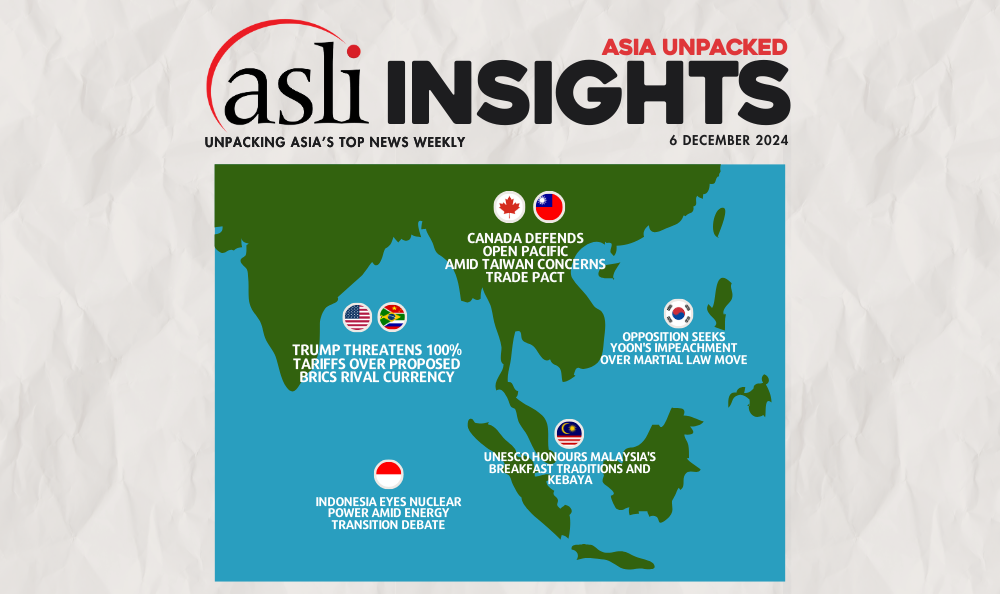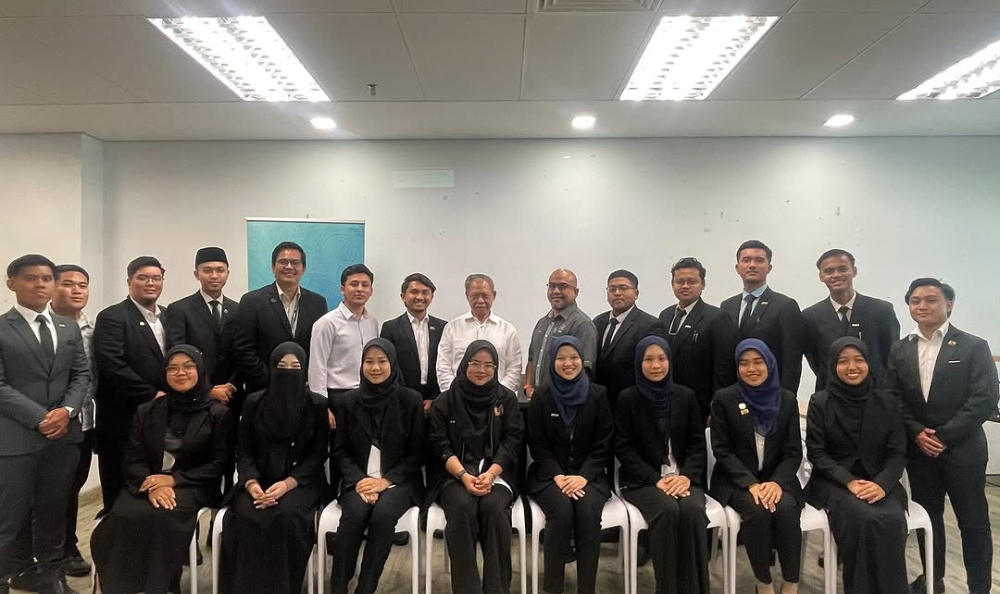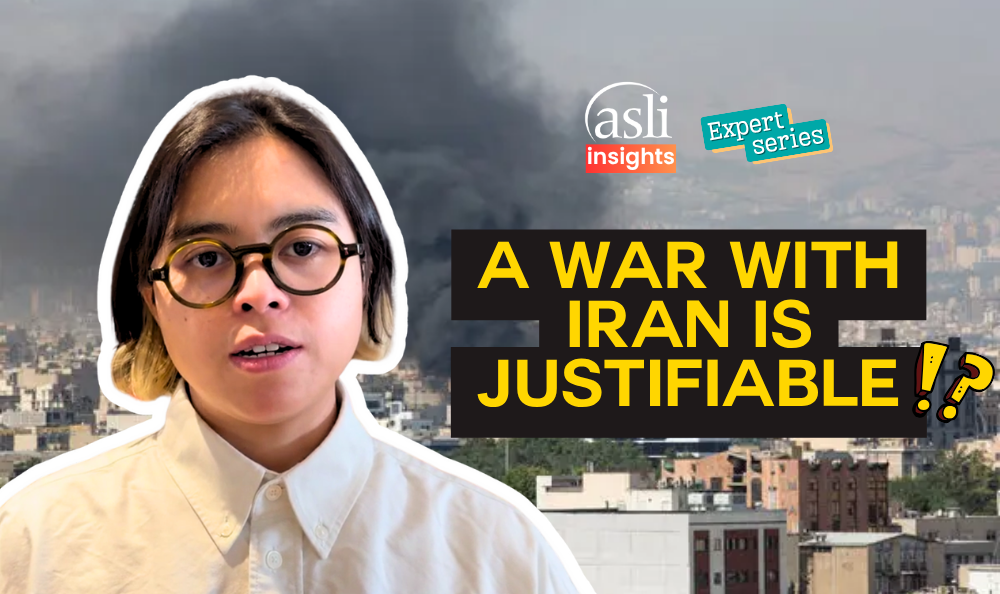
ASLI INSIGHTS: Asia Unpacked | 6 December 2024
Stay Ahead with Asia Unpacked! Trump threatens 100% tariffs on BRICS, South Korea faces turmoil with Yoon’s impeachment bid, and Malaysia celebrates as UNESCO honours its breakfast culture and kebaya!
Stay informed. Stay ahead. Here’s what’s making headlines this week:
1) Trump Threatens 100% Tariffs Over Proposed BRICS Rival Currency
US President-elect Donald Trump has warned BRICS nations of 100% tariffs if they pursue a proposed currency designed to rival the U.S. dollar. The BRICS alliance, comprising Brazil, Russia, India, China, and South Africa, recently expanded to include Iran, Egypt, Ethiopia, and the UAE. This coalition aims to enhance its economic independence and reduce reliance on the dollar in global trade. The potential BRICS currency is seen as a move to counteract U.S. dominance and sanctions, which many in the bloc view as a tool of political leverage. However, Trump’s strong response reflects U.S. efforts to protect the dollar’s global supremacy. Although still in its early stages, the currency proposal could have significant implications for international financial systems and trade dynamics. Critics argue Trump’s aggressive rhetoric risks deepening geopolitical divides as BRICS nations seek greater autonomy.
Read more:
- https://www.bbc.com/news/articles/cgrwj0p2dd9o.amp
- https://www.dw.com/en/trump-threatens-100-tariffs-on-brics-over-new-currency-plans/a-70934600
2) Canada Defends Open Pacific Amid Taiwan Concerns Trade Pact
Canada reaffirmed that the Comprehensive and Progressive Agreement for Trans-Pacific Partnership (CPTPP) remains open to new members, following Taiwan’s complaints about delays in its accession process. Taiwan accused Canada of prioritising the United Kingdom, which recently joined the 11-nation trade pact. Canada’s Trade Minister emphasised that all applicants, including Taiwan, must meet the bloc’s high standards, ensuring quality over speed in expansion decisions. Taiwan sees CPTPP membership as essential to counter China’s economic pressures, while China opposes Taiwan’s inclusion. The CPTPP is a pivotal trade agreement in the Asia-Pacific, and debates over new entrants underscore its growing geopolitical significance. Canada’s approach reflects the challenges of balancing economic growth with regional diplomatic tensions.
Read more:
- https://www.channelnewsasia.com/world/canada-says-pacific-trade-pact-open-new-members-after-taiwan-complains-4783361
- https://focustaiwan.tw/politics/202412030009
3) Opposition Seeks Yoon's Impeachment Over Martial Law move
South Korea is in political turmoil as opposition lawmakers plan to impeach President Yoon Suk Yeol following his controversial martial law declaration, which sought to ban political activity and censor the media. The move triggered public outrage, international concern, and accusations of treason against Yoon and top ministers. Defence Minister Kim Yong-hyun resigned after recommending martial law, while the army chief offered to step down. The impeachment vote, set for Saturday, requires support from at least eight ruling-party lawmakers to pass. Investigations into treason claims are underway, with travel bans issued. Protests highlight fears of a return to dictatorship, and the crisis has unsettled global markets. If impeached, South Korea’s Constitutional Court will determine Yoon’s fate.
Read more:
- https://www.freemalaysiatoday.com/category/highlight/2024/12/04/s-korean-opposition-move-to-impeach-yoon-after-martial-law-bid/
- https://www.reuters.com/world/asia-pacific/south-korean-ruling-party-oppose-yoons-impeachment-2024-12-04/
4) Indonesia Eyes Nuclear Power Amid Energy Transition Debate
Indonesia's President Prabowo Subianto is pushing for nuclear power to meet rising energy demands and achieve net-zero emissions by 2060. At COP29, his administration announced plans to add 100GW of power in 15 years, 75% from clean energy, including 5GW from nuclear. Proposals include building two nuclear plants and exploring modular reactors for small industries. While supporters praise the move as realistic, critics cite high costs, radioactive waste risks, and dependency on foreign technology. Renewable energy advocates argue Indonesia's vast solar and wind potential offers faster, cheaper solutions. The initiative has sparked debate, with concerns about safety, public perception, and transparency. Experts stress the need for synergy between nuclear and renewable energy to drive sustainable development.
Read more:
5) UNESCO Honours Malaysia's Breakfast Traditions and Kebaya
Malaysia’s vibrant breakfast culture and the iconic kebaya have earned global recognition, showcasing the nation’s rich heritage. UNESCO inscribed Malaysia's breakfast traditions, including beloved dishes like nasi lemak, roti canai, and thosai, into the Intangible Cultural Heritage list. This accolade highlights the communal essence of these breakfasts and their role in fostering unity among Malaysians. Simultaneously, the kebaya, a traditional Southeast Asian attire, joined the UNESCO list through a collaborative nomination by Malaysia, Singapore, Brunei, Indonesia, and Thailand. This marks a landmark in cultural preservation and regional cooperation, emphasising the kebaya as a shared symbol of history, identity, and artistry. These milestones not only elevate Malaysia’s cultural prestige but also strengthen its global standing, inspiring greater appreciation for the traditions that unite and define Southeast Asia.
Read more:
- https://www.bernama.com/en/region/news.php?id=2371251
- https://www.malaymail.com/news/life/2024/12/05/bring-on-the-nasi-lemak-roti-canai-and-thosai-malaysias-breakfast-culture-earns-unesco-recognition-video/158952
Empowering Leaders, Advancing Societies.
Follow us for Asia’s weekly highlights: https://linktr.ee/asli_myofficial
#ASLI #EmpoweringLeaders #AdvancingSocieties #Asia #News #Malaysia #BRICS #SouthKorea #Taiwan #Indonesia




